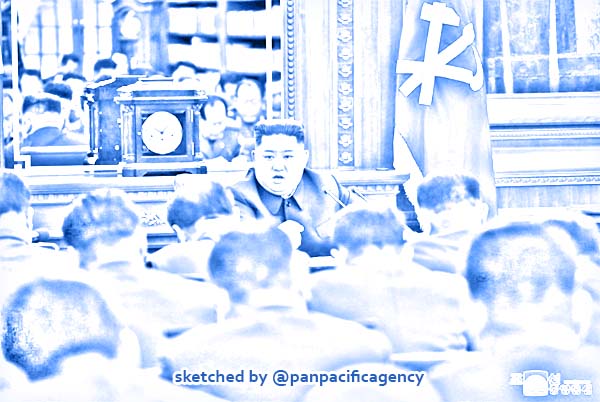North Korea sends no Christmas “gift” to US in consideration of China

North Korean leader Kim Jong Un attends a meeting of the ruling Workers' Party. KNS/Kyodo. Sketched by the Pan Pacific Agency.
BEIJING, Dec 27, 2019, Kyodo. Christmas has passed without any “gift” from North Korea, despite intensifying concern that it would launch an intercontinental ballistic missile on the most widely celebrated holiday in the United States, Kyodo News reported.
Behind Pyongyang’s refraining from firing a longer-range missile on Christmas Day may be the sway of China, which has recently been stepping up its commitment to ease tensions sparked by North Korea, some diplomatic sources said.
With denuclearization talks between Washington and Pyongyang at a standstill, China, along with Russia, submitted a draft resolution at the U.N. Security Council earlier this month to loosen economic sanctions against North Korea.
North Korea, meanwhile, has threatened to take an unspecified “new path” if the United States does not shift its “hostile” stance by the end of this year, indicating that it may terminate bilateral nuclear negotiations that started in early 2018.
Ri Thae Song, North Korea’s vice foreign minister in charge of U.S. affairs, also said in a statement released weeks ago, “It is entirely up to the U.S. what Christmas gift it will select to get.”
But North Korea restrained itself on Wednesday, with the diplomatic sources saying it may have done so in consideration of China — its closest and most influential ally.
“There is a rumor that North Korea would end denuclearization talks with the United States and deepen cooperation with China in economic and military terms next year. This might be a new path North Korea is considering,” one of the sources said.
China has expressed eagerness to loosen economic sanctions against Pyongyang on the grounds that it has suspended nuclear and ICBM tests since late 2017, while the administration of U.S. President Donald Trump has pledged to keep them in place.
“Under such circumstances, North Korea has not been able to make a move that would make China lose face,” the source added.
On Christmas Eve, Chinese Premier Li Keqiang said Beijing hopes issues on the Korean Peninsula will be resolved “through dialogue” after meeting with his Japanese and South Korean counterparts in China’s southwestern city of Chengdu.
Emphasizing that denuclearization on the divided peninsula should be realized in a peaceful manner, China has called on the two countries to abstain from taking military action.
Still, speculation has been lingering that Pyongyang would restart nuclear and ICBM tests if negotiations with Washington fail to achieve a breakthrough, which is reminiscent of the fear of U.S.-North Korea war a few years ago.
A former senior Pentagon official has warned that the situation on the peninsula could become “very dangerous in the next month or two,” where an incident involving North Korea could spiral into a second Korean War, dragging Japan and China into it.
“If after January, North Korea goes back to testing ICBMs, which is what it was doing until it stopped in November 2017, then it’s quite possible Trump will attack North Korea,” Graham Allison, a former assistant secretary of defense under President Bill Clinton, said in a recent interview in Tokyo.
North Korea launched a spate of what appeared to be short-range ballistic missiles in defiance of Security Council resolutions since May. In December, it apparently tested a liquid-fuel engine for a long-range ballistic missile twice.
Nevertheless, another source said that North Korea is unlikely to resume nuclear or ICBM tests, given that the diplomatic environment surrounding the nation has been “completely different” from that in 2017.
That year, relations between Pyongyang and Beijing deteriorated, as North Korean leader Kim Jong Un pursued nuclear ambitions and China, which worried about possible radioactive contamination from nuclear tests, strengthened economic sanctions against the neighbor.
In 2018, however, Kim surprisingly sought diplomatic openings in his address on Jan. 1 and visited China in March in his first foreign trip since becoming the supreme leader following the death of his father in December 2011.
So far, Kim has traveled to China four times for talks with President Xi Jinping, leading to recovery in Sino-North Korean ties.
“Now, North Korea is not in a position where it can carry out nuclear and ICBM tests because it is putting emphasis on relations with China,” the source said. “North Korea understands that if it does such tests again, it would lose the backing of China.”
Pyongyang has also rebuilt amicable ties with Russia since Kim visited the country’s eastern port city of Vladivostok in April 2019 to hold talks with President Vladimir Putin.
North Korea was originally founded on Sept. 9, 1948, backed by the Soviet Union, of which Russia is the main successor.
“For North Korea, both China and Russia would be very important partners for its economy and defense if it really ends bilateral negotiations with the United States,” the source said. “Next year, Kim may make more efforts to enhance relations with Xi and Putin.”
The United States and North Korea remain technically in a state of war as the 1950-1953 Korean War — in which U.S.-led U.N. forces fought alongside the South against the North, backed by China and the Soviet Union — ended in a cease-fire, not a peace treaty.
They have no diplomatic ties.